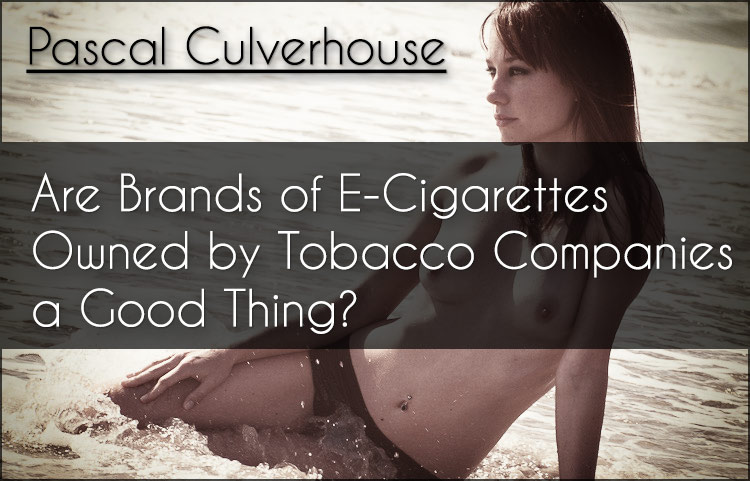Table of Contents [show]
Are Brands of E-Cigarettes Owned by Big Tobacco Companies a Good Thing?
An increasing number of e-cigarette brands are owned by Big Tobacco. Over the past few years, cigarette companies have either bought out existing e-cig brands or have created their own. This includes Vype — owned by British American Tobacco (BAT), the same company that produces and sells Pall Mall and Benson & Hedges cigarettes. It’s no secret that smoking is the enemy here, with cigarettes killing half of its users — that’s six million every year.
There are currently 2.8 million e-cigarette users in the UK alone, with 74% of those being former smokers. With smoking cessation the ultimate goal, does it really matter whether these brands are owned by Big Tobacco or not?
How Many Companies Currently Invest in E-Cigarettes?
The e-cigarette industry is currently worth $235 million (or £193 million). The harmful effects of smoking are now too well known for people to argue otherwise, so is it really any surprise that Big Tobacco is venturing into this market? In October, Imperial Tobacco, a child company of BAT, announced its plans to enter the e-cigarette industry in Canada. In 2013, British American Tobacco created Vype, which has gone on to be one of the leading brands of e-cigarette in the UK, with a 35% share in the market.
While the e-cigarette has been around for some time now, the industry has only really started growing and gaining mainstream traction and exposure over the past four years. Lorillard was the first big player to invest in e-cigarettes in 2012 when it acquired Blu e-cig. In 2014, Reynolds American, backed by Imperial Tobacco (which connected to BAT — surprise, surprise) purchased Lorillard’s assets, including Blu, and continues to own the company today.
In 2012, British American Tobacco also acquired the rights to Intellicig: one of the earliest e-cig brands to enter the market. While it planned to assert itself as a leading global e-cig brand, in 2015, BAT announced it was withdrawing the brand to focus on promoting the line of Vype products.
While it may seem that so many big players in the tobacco industry are now investing in e-cigarettes, in reality, the number is lower than you’d expect. In 2014, research showed that just ten out of 466 e-cigarette brands were owned by Big Tobacco. When we look at what companies are choosing to invest in e-cigarettes, we can see that the majority are subsidiaries are in some way related to British American Tobacco.
Why Would BAT Want to Invest in E-Cigarettes?
The evidence is clear: e-cigarettes are drastically reducing the business of cigarette manufacturers. With an increasing number of individuals recognising the benefits of e-cigs and opting to vape instead of smoke, tobacco companies are faced with a dilemma: face the fact that they’re losing money to e-cigarette manufacturers and retailers, or do something about it. E-cigarettes are a serious competitor, and the best alternative to making money from cigarettes is to profit from the very thing that’s posing a challenge.
Look at it this way: Coca-Cola made its name selling full-fat coke to millions of people around the world. But as we’ve become more health conscious, we now realise that a high sugar intake is not good for us. So what did it do? It began to produce low-sugar and no-sugar alternatives. It’s been proven by Public Health England that e-cigarettes are 95% less harmful than cigarettes, so in the eyes of Big Tobacco, they’re simply catering to a demand for healthier products.
So, How Will It Affect the E-Cigarette Industry?
In Europe, we’re governed by the Tobacco Products Directive (TPD). While this has had an impact on the way e-cigarette retailers can promote and advertise their products, as well as the types of products manufacturers can create, the impact is unlike what we’ve seen in the US. The Food & Drug Agency (FDA) regulations will now require approval of all e-cigarette products on the market — a move that could cost up to $2 million per application. This means that an increasing amount of smaller manufacturers will be put out of business. Only stable businesses, namely those owned by large tobacco corporations, will be able to afford these enormous fees. This will mean that a significant amount of revenue will be going directly into the pockets of those that created the need and demand for e-cigarettes in the first place. An ethical decision for vaping advocates if ever there was one.
Despite all of this, e-cigarette manufacturers need not be too concerned. E-cig starter kits — much like the ones tobacco-owned brands like Vype and Blu produce — are hugely popular, but they can’t compete with more advanced devices. Once vapers decide that an e-cigarette is for them, they’ll often find themselves looking to buy a more powerful (and expensive) e-cigarette with features such as temperature control and variable wattage and voltage. In this case, consumers will find themselves more drawn to dedicated e-cig giants, such as Innokin and KangerTech. In this respect, Big Tobacco brands simply can’t compete.
Is There Any Other Potential Impact We Should Be Aware Of?
The perception of the vaping industry has long been determined by the public. Despite Public Health, the NHS and the British Heart Foundation all backing e-cigarettes as a safe, effective tool, just 15% of the public believe that vaping is less harmful than smoking. This isn’t helped by the classification of e-cigarettes as tobacco products, despite the fact that, fundamentally, they are not. The real danger is that the more the vaping industry is associated with Big Tobacco, the harder it will be to reverse public opinion and the easier it will be for anti-vaping proponents to slam the scientific studies that prove vaping to be more beneficial to our health.
So, is e-cigarette brands owned by Big Tobacco necessarily evil? That’s up to you. What can be said is that the effects of smoking are profound and devastating. If such companies were truly invested in harm reduction, as they claim, they would stop selling them altogether. In the meantime, however, anything that helps smokers quit is a win for public health and a win for us. Over the long term, we can only hope that the clear distinction between e-cigarettes and traditional cigarettes and the benefits of vaping over smoking are made more transparent to the public.
Author Bio: Pascal Culverhouse founded the Electric Tobacconist in 2013. Less than 18 months later, the business was the UK’s number one online retailer of e-cigarettes. He still finds time to vape every day and keeps up with the latest e-cig trends.





